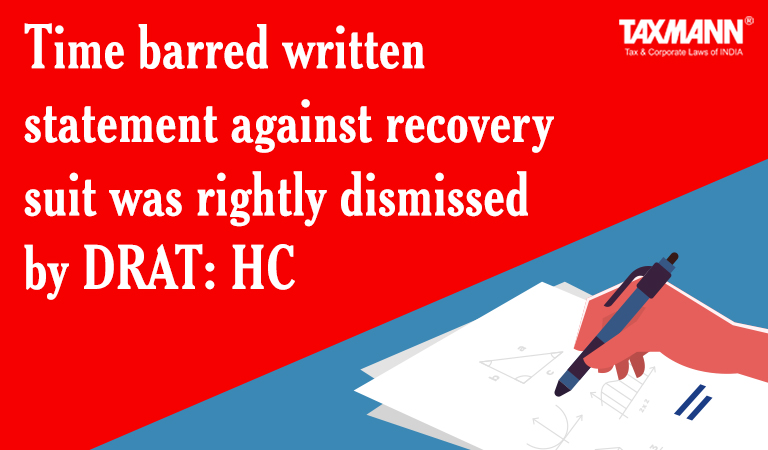Time barred written statement against recovery suit was rightly dismissed by DRAT: HC
- Blog|News|FEMA & Banking|
- 3 Min Read
- By Taxmann
- |
- Last Updated on 19 November, 2021

Case Details: Anita Garg v. State Bank of India - [2021] 132 taxmann.com 78 (Delhi)
Judiciary and Counsel Details
-
- Vipin Sanghi and Jasmeet Singh, JJ.
- Ashish Batra, Adv. for the Petitioner.
- Ankur Mittal and Karan Setiya, Advs. for the Respondent.
Facts of the Case
In the given case, the company NML availed of various loan facilities from respondent Bank and, petitioners stood as guarantor in respect of the said loan. The bank, on the other hand, filed an application under section 19 before the Debt Recovery Tribunal (DRT) claiming an amount of Rs. 916 crores against the borrower company and the petitioners. However, the DRT passed interim orders restraining the petitioners from alienating the mortgaged properties. Notice of the application was directed to be issued to the petitioners.
In the meanwhile, the company NML and the petitioners also filed their joint written statement cum counter-claim for Rs. 1943.63 crores. Upon filing of written statement and counter-claim by the petitioners along with borrower – company, the bank filed 2 applications before the DRT. One of them was under section 19(25) seeking striking off of the written statement and counterclaim filed by the defendants and another application under Order 7 rule 11 read with 151 of the Civil Procedure Code, seeking rejection of counterclaim filed by the defendants.
The sum and substance of the averments in the application was that as per sub-section (5)(i) of section 19 petitioners were obliged to file a written statement of defence, including claims for set-off (under sub-section (6)), or a counter-claim (under sub-section (8)), if any, within 30 days from the date of service of summons. In the case where a defendant fails to file the written statement within the said period of 30 days, the Presiding Officer – only in exceptional cases and in special circumstances – to be recorded in writing, can extend the period by a further period ‘not exceeding fifteen days to file the written statement’. However, in the instant case, the counterclaim was filed after 45 days from the service of summoning.
The petitioners, on the other hand, submitted that summons of suit served on 27-8-2019 was illegible and since legible copies of documents were furnished to the petitioners only on 21-9-2019, the period of 45 days should begin to run from 21-9-2019, and filing of their written statement and counter-claim on 14-10-2019 was within the period stipulated under section 19(5).
High Court Held
The High Court of Delhi noted that petitioners had neither claimed before DRT that any copies or documents were illegible nor did they produce so-called illegible copies of documents before DRT which, if produced, would have satisfied DRT about their being illegible.
Thus, this, lead to the conclusion that petitioners were effectively served as per affidavit of service filed by the bank. Further, if they were not provided with legible copies to prepare their written statement, it would not have been possible for them to file an application for rejection of the application filed by the bank. Consequently, the bank’s application for striking off of written statements filed by petitioners was rightly upheld by DRAT.
List of Cases Referred to
-
- SCG Contracts (India) (P.) Ltd. v. K.S. Chamankar Infrastructure (P.) Ltd. [Civil Appeal No. 1638 of 2019, dated 12-2-2019] (para 30)
- Gujarat Electricity Board v. Atmaram Sungomal Poshani [1989] 2 SCC 602 (para 33)
- Basant Singh v. Roman Catholic Mission [2002] 7 SCC 531 (para 34)
- Usha Agarwal v. Union of India [2007] 1 SCC 295 (para 63).
Disclaimer: The content/information published on the website is only for general information of the user and shall not be construed as legal advice. While the Taxmann has exercised reasonable efforts to ensure the veracity of information/content published, Taxmann shall be under no liability in any manner whatsoever for incorrect information, if any.

Taxmann Publications has a dedicated in-house Research & Editorial Team. This team consists of a team of Chartered Accountants, Company Secretaries, and Lawyers. This team works under the guidance and supervision of editor-in-chief Mr Rakesh Bhargava.
The Research and Editorial Team is responsible for developing reliable and accurate content for the readers. The team follows the six-sigma approach to achieve the benchmark of zero error in its publications and research platforms. The team ensures that the following publication guidelines are thoroughly followed while developing the content:
- The statutory material is obtained only from the authorized and reliable sources
- All the latest developments in the judicial and legislative fields are covered
- Prepare the analytical write-ups on current, controversial, and important issues to help the readers to understand the concept and its implications
- Every content published by Taxmann is complete, accurate and lucid
- All evidence-based statements are supported with proper reference to Section, Circular No., Notification No. or citations
- The golden rules of grammar, style and consistency are thoroughly followed
- Font and size that’s easy to read and remain consistent across all imprint and digital publications are applied



 CA | CS | CMA
CA | CS | CMA
